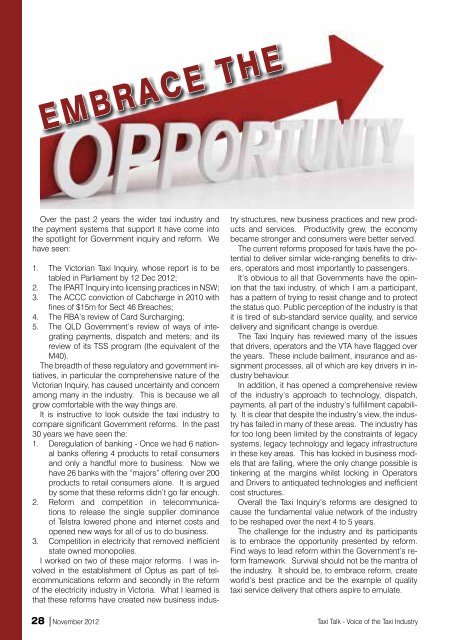Download (7 MB) - Taxi Talk Magazine
Download (7 MB) - Taxi Talk Magazine
Download (7 MB) - Taxi Talk Magazine
You also want an ePaper? Increase the reach of your titles
YUMPU automatically turns print PDFs into web optimized ePapers that Google loves.
E<strong>MB</strong>rACE ThE<br />
Over the past 2 years the wider taxi industry and<br />
the payment systems that support it have come into<br />
the spotlight for Government inquiry and reform. We<br />
have seen:<br />
1. The Victorian <strong>Taxi</strong> Inquiry, whose report is to be<br />
tabled in Parliament by 12 Dec 2012;<br />
2. The IPART Inquiry into licensing practices in NSW;<br />
3. The ACCC conviction of Cabcharge in 2010 with<br />
fines of $15m for Sect 46 Breaches;<br />
4. The RBA’s review of Card Surcharging;<br />
5. The QLD Government’s review of ways of integrating<br />
payments, dispatch and meters; and its<br />
review of its TSS program (the equivalent of the<br />
M40).<br />
The breadth of these regulatory and government initiatives,<br />
in particular the comprehensive nature of the<br />
Victorian Inquiry, has caused uncertainty and concern<br />
among many in the industry. This is because we all<br />
grow comfortable with the way things are.<br />
It is instructive to look outside the taxi industry to<br />
compare significant Government reforms. In the past<br />
30 years we have seen the:<br />
1. Deregulation of banking - Once we had 6 national<br />
banks offering 4 products to retail consumers<br />
and only a handful more to business. Now we<br />
have 26 banks with the “majors” offering over 200<br />
products to retail consumers alone. It is argued<br />
by some that these reforms didn’t go far enough.<br />
2. Reform and competition in telecommunications<br />
to release the single supplier dominance<br />
of Telstra lowered phone and internet costs and<br />
opened new ways for all of us to do business.<br />
3. Competition in electricity that removed inefficient<br />
state owned monopolies.<br />
I worked on two of these major reforms. I was involved<br />
in the establishment of Optus as part of telecommunications<br />
reform and secondly in the reform<br />
of the electricity industry in Victoria. What I learned is<br />
that these reforms have created new business indus-<br />
28 |November 2012<br />
try structures, new business practices and new products<br />
and services. Productivity grew, the economy<br />
became stronger and consumers were better served.<br />
The current reforms proposed for taxis have the potential<br />
to deliver similar wide-ranging benefits to drivers,<br />
operators and most importantly to passengers.<br />
It’s obvious to all that Governments have the opinion<br />
that the taxi industry, of which I am a participant,<br />
has a pattern of trying to resist change and to protect<br />
the status quo. Public perception of the industry is that<br />
it is tired of sub-standard service quality, and service<br />
delivery and significant change is overdue.<br />
The <strong>Taxi</strong> Inquiry has reviewed many of the issues<br />
that drivers, operators and the VTA have flagged over<br />
the years. These include bailment, insurance and assignment<br />
processes, all of which are key drivers in industry<br />
behaviour.<br />
In addition, it has opened a comprehensive review<br />
of the industry’s approach to technology, dispatch,<br />
payments, all part of the industry’s fulfillment capability.<br />
It is clear that despite the industry’s view, the industry<br />
has failed in many of these areas. The industry has<br />
for too long been limited by the constraints of legacy<br />
systems, legacy technology and legacy infrastructure<br />
in these key areas. This has locked in business models<br />
that are failing, where the only change possible is<br />
tinkering at the margins whilst locking in Operators<br />
and Drivers to antiquated technologies and inefficient<br />
cost structures.<br />
Overall the <strong>Taxi</strong> Inquiry’s reforms are designed to<br />
cause the fundamental value network of the industry<br />
to be reshaped over the next 4 to 5 years.<br />
The challenge for the industry and its participants<br />
is to embrace the opportunity presented by reform.<br />
Find ways to lead reform within the Government’s reform<br />
framework. Survival should not be the mantra of<br />
the industry. It should be, to embrace reform, create<br />
world’s best practice and be the example of quality<br />
taxi service delivery that others aspire to emulate.<br />
<strong>Taxi</strong> <strong>Talk</strong> - Voice of the <strong>Taxi</strong> Industry

















